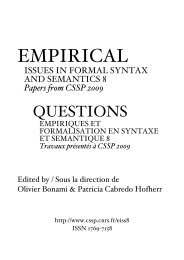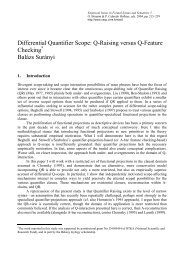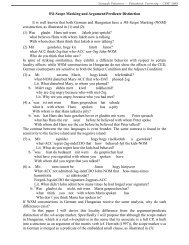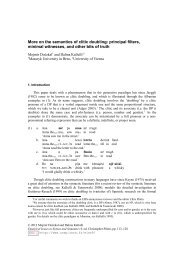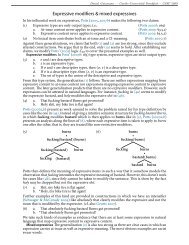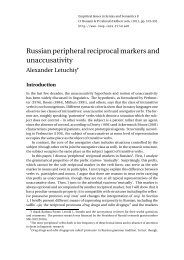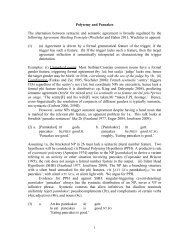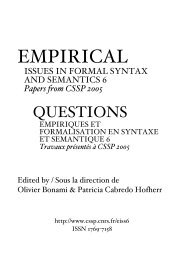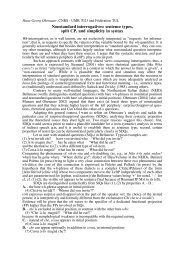Empirical Issues in Syntax and Semantics 9 (EISS 9 ... - CSSP - CNRS
Empirical Issues in Syntax and Semantics 9 (EISS 9 ... - CSSP - CNRS
Empirical Issues in Syntax and Semantics 9 (EISS 9 ... - CSSP - CNRS
Create successful ePaper yourself
Turn your PDF publications into a flip-book with our unique Google optimized e-Paper software.
2.2. More eligible contexts <strong>in</strong> Ternois<br />
But Ternois provides more potential contexts for DCC than the other languages mentioned.<br />
Independently of DCC, Doubly Filled Comps are <strong>in</strong>deed frequent: 12 any WH-P is commonly<br />
followed by que. This is the case for relatives <strong>and</strong> embedded <strong>in</strong>terrogatives, whatever the WH-P<br />
may be, as shown <strong>in</strong> (7a-b). Furthermore, si ‘if/whether’, <strong>in</strong>troduc<strong>in</strong>g hypotheticals <strong>and</strong><br />
embedded polar questions <strong>and</strong> qu<strong>and</strong> ‘when’ <strong>in</strong>troduc<strong>in</strong>g temporal adverbial clauses behave as<br />
WH-expressions <strong>in</strong> that they are followed by que, as <strong>in</strong> (8a-c). 13<br />
(7) a. E<strong>in</strong> homm’ dont qu’ <strong>in</strong> sait l’ gr<strong>and</strong>eur d’âm’ (Relative clause)<br />
A man of-whom that we know the greatness of soul’<br />
‘A man whose greatness of soul we know’<br />
b. Nous savons qu’m<strong>in</strong>t qu’ il est joïeux (R46) (Embedded question)<br />
We know how that he is joyful<br />
‘We know how happy he is’<br />
(8) a. qu<strong>and</strong> qu’ j’arp<strong>in</strong>se à l’familièr’ cité / J’ai mo<strong>in</strong>s cair chés boul’vards d’acht’heure (R25)<br />
when that I reth<strong>in</strong>k to the old city I have less dear the boulevards of now<br />
‘When I remember the familiar city, I like the present boulevards less’<br />
b. si qu’ t’ as du guignon, … (R49)<br />
if that you have of luck, …<br />
‘if you are lucky, …’<br />
c. Jé n’ sus pon, […], <strong>in</strong> m’sure / D’ dir’ si qu’ i’ met d’ l’arg<strong>in</strong>t d’ côté (R52)<br />
I am not, […], able / to say whether that he puts of the money aside<br />
‘I am not able to tell whether he saves money’<br />
When this <strong>in</strong>stance of que is followed by a left-peripheral XP, it can also be doubled. (9)<br />
illustrates the structure with a doubled complementizer that corresponds to (7) <strong>and</strong> (8) for<br />
relatives, embedded questions, embedded exclamations, <strong>and</strong> adjunct clauses respectively:<br />
(9) a. l’ pemièr’ ducasse, dont qu’ nou populace, Qu’ all’ va profiter (R150)<br />
the first fair of-which that our people fem that she will enjoy<br />
‘the first fair that our people (that it) will enjoy’<br />
b. Sur chés rimparts, édù que ch’l’herp’ qu’ all’ poussaut drue (R30)<br />
On these ramparts where that the grass that she grew thick<br />
c. V’là comm<strong>in</strong>t qu’ à Verdun, «l’Ch<strong>in</strong>quième» qu’ il a pris s’ part (R125)<br />
Here’s how that <strong>in</strong> Verdun the Fifth that it has taken its part …<br />
‘That’s how <strong>in</strong> Verdun the Fifth regiment (that it) took its part’<br />
d. Et, qu<strong>and</strong> qu’ la guerre’ qu’ all’ s’ra passée,<br />
And, when that the war that she be.FUT past<br />
‘And, when (that) the war (that it) is over’<br />
e. si qu’ edman qu’ j’épreuv’ seul’m<strong>in</strong>t l’ s<strong>in</strong>tim<strong>in</strong>t que … (Ec3)<br />
if that tomorrow that I feel only the feel<strong>in</strong>g that …<br />
‘if (that) tomorrow (that) I just have the feel<strong>in</strong>g that …’<br />
12<br />
A doubly filled complementizer seems to be optional <strong>in</strong> Ternois – compare. (ia) <strong>and</strong> (ib) –, but the<br />
presence of que is clearly the most frequent case.<br />
i. a. qu<strong>and</strong> qu’ j’arp<strong>in</strong>se à l’familièr’ cité (R25) (lit.: ‘when that I th<strong>in</strong>k at the familiar city’)<br />
b. Qu<strong>and</strong> ej s’rai, pour toudis, … <strong>in</strong>dormi (R1) (lit.:‘When I will be, for ever, …, asleep’)<br />
13<br />
See Dagnac (2011a <strong>and</strong> 2012, respectively) for direct questions <strong>and</strong> WH-clauses <strong>in</strong> general.<br />
81



